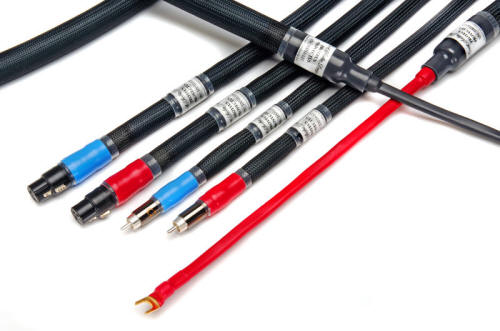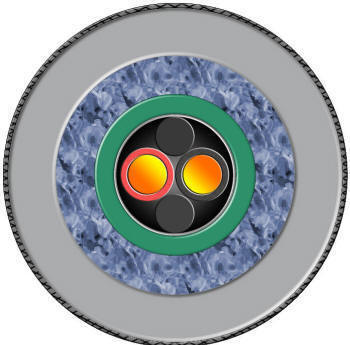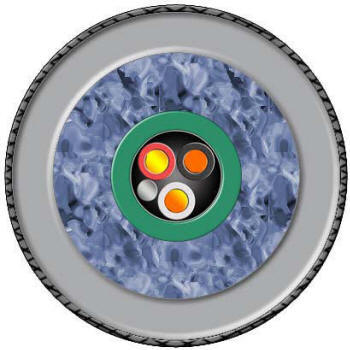You are reading the older HTML site
Positive Feedback ISSUE
march/april 2008
purist audio design
Proteus Provectus cables
as reviewed by Dave Clark

|
The Proteus Provectus came into our system after an extensive push from fellow PFO writer, and long time Purist Audio Design user and proponent, Albert Porter. He felt that the PAD line of cables is so good, well… that they are so good that they are simply better than anything else out there—regardless the price, design, or whatever. Albert challenged me to try something from the PAD line and since he knew their stuff way better than I did, I allowed him to choose what he felt would be the best match for my system—as well as my current cables reference(s): Kubala-Sosna's Emotions ($2700 a meter) and the Clairvoyant 4D from Audio Magic ($3200 a meter). Both are stellar cables in their own right, though each with their own sins of omission—hey, nothing's perfect.
After a few email exchanges Albert suggested the Proteus Provectus line because 1), it is a good price comparison to what I am currently using, and 2) it is new to the PAD stable of fluid (Ferox) shielded cables and offers much of what the three models above it can do for a lot less cash. Besides, from his conversations with Jim Aud (the man behind PAD) this is the way to go as the Proteus Provectus is a killer product just waiting for its break. So what showed up on our doorstep were enough PAD cables to string our whole system together and then some: balanced and signal-ended interconnects of various lengths as well as a pair of single-run speaker cables terminated with WBT bananas. Now while the Proteus Provectus is like the fourth down the chain from the top, they are not what one would consider inexpensive. Running at a cool $3500 for the 1-meter balanced versions (the RCA single-ended is a hundred dollars less) and $6900 of the 1.5-meter single run speaker cables, these are a serious purchase.

The Proteus Provectus speaker cable (this is the negative cable, the positive cable is identical)
|
Conductor |
Solid Core single crystal |
|
Metals |
Copper |
|
Shielding |
Fluid |
|
Dielectric material(Primary) |
PVC |
|
Damping Material |
Fluid |
|
Gauge (effective) |
9 AWG |
|
Current capacity (DC) |
25 A @ 105°C |
|
Resistance |
13.3 mΩ/m (conductor) |
|
Break-in time (hours) |
150 |
|
Cable diameter (nominal) |
3/4" OD (one channel) |
|
Material treatment |
3x Cryomag© |

The Proteus Provectus interconnect
|
Conductor |
Solid Core |
|
Metals |
Copper single crystal |
|
Shielding |
Foil with drain wire |
|
Dielectric material (Primary) |
PVC |
|
Damping Material |
Fluid |
|
Gauge (effective) |
22 AWG |
|
Capacitance |
170 pF/m ±15% (pin-to-shield) |
|
Resistance |
13.2 mΩ/m (conductor) |
|
Break-in time (hours) |
200 |
|
Cable diameter (nominal)
|
1/2" OD (one channel) 5/8" OD (one channel) |
|
Material treatment |
Triple (3x) Cryomag© |
The Proteus Provectus uses a unique solid-core copper construction with a proprietary fluid shielding. The use of solid-core is a shift from the other PAD cables that feature alloys (along with gold, copper, and silver) in various multi-stranded multi-conductor combinations. While the use of a fluid remains the constant, the overall design of the Proteus Provectus sets it apart from the rest of its brethren. I talked to Jim about why he has shifted from what he has done in the other lines. His response is that to do what he wanted to fill the gap between the cables on either side of the Proteus Provectus and at an acceptable price point required a new approach. Jim's approach is one that is completely based on science and how wire and cables really work. See Jim is all about the theory and practice of cable design and while he does go for things that might be skirting the mainstream—such as cyro'ing cables and the use of fluids to damp and shield—he is a true engineer with the credentials to back it up (can you say advanced degrees in physics?).
To quote from an interview with Jim that ran way back in Issue 15 of PFO…
"Jim takes a holistic approach to designing cables, considering all parameters which influence the sound of a cable, not just a few parameters in isolation. Purist employs two full-time engineers, who work with Jim in designing new cables. They use computer modeling to steer them towards a particular design, and have a machine shop and construction facility that lets them build prototypes to finalize a design. Purist has about 50 beta testers around the country, and two or three bands that try Purist cables under stressful real-world conditions. Feedback from beta testers is used to modify designs into a final commercial product line."
Which means that when Jim designs a cable, well …it ain't just some wire in a fancy jacket. No, the Proteus Provectus is a very handsome cable that is quite flexible (the interconnects are to a great extent, whereas the speaker cables are rather stiff, though quite compliant when bent to the shape one requires in connecting between an amp and a speaker), elegant in appearance, and the result of many hours to construct (no doubt one of the key contributors to their cost). They have been in use for several months now without a single hiccup that would cause any sane (or insane for that matter) audio-lad to grumble about: leaks (remember that there is fluid inside), shorts, noise, hum, nada. Each cable comes in its own bag with a serial number in case of warranty issues. It is suggested that the cables will benefit from an extensive break-in (I gave them a good 400-500 hours just to make sure!), based on the materials and construction.
So I ran them for a number of days on an AudioDharma Cable Cooker™ and then fed them a combination of the PAD System Enhancer disc and music (FM radio) for a few weeks on another system (actually a fourth system in the garage used just for this purpose). It is also suggested that after any extensive break-in the cables will need to settle into place—that is you should let them lay undisturbed with a signal running to allow for the fluids and such to settle. This means that swapping the Proteus Provectus and other cables in and out is not a good thing to do if one is to realize how they compare against another cable in-house; one should carefully disconnect them to cause as little disruption to their stasis as is possible. Not that difficult of a thing to do and besides I have come to find that most cables prefer this treatment anyhow. Best to not ruffle a cable's feathers if you want to hear what they can do …you got to let them settle into place to sound their best.
What one gets in the Proteus Provectus is a dead quiet cable—and I mean dead quiet. The Proteus Provectus offers the blackest of blacks with no hint …that is NO hint of noise or whatever that is a result of RFI/EMI or whatever populating our audio-environment. Meaning that the music has a great sense of presence as it emerges or stands out against this deep dark abyss of emptiness. This results in amazing clarity, startling overall dynamics (micro and macro), and, well… they just pass the music with nothing that appears to be causing any harm to the signal. The overall design seems to be doing its trick as the cables are quite immune to various known gremlins here in my system.
One also gets a cable that leans more to the warmer side of neutrality, though with this lusciously captivating warmth comes a spot on tonality that is as honest as all get out and that is oh so musically right. The Proteus Provectus is quite tonally even and rich in harmonic color; these are cables that, for me at least, get out of the way of the music by offering little to criticize in terms of what we have heard from other cables as a clearly recognized "sonic signature". I am referring to a sonic signature in the sense of something being imparted on the sound or the music in such a way that it draws undue attention to the tonal shift or aberration.
Yeah, all cables have a sonic signature to some extent—and for some this is clearly evident in how we categorize them: lean, fat, slow, light, dark, rich, warm, dull, analytical, etc. And, yes the Proteus Provectus do have a signature of sorts by their being considered a dark cable, but only when compared to cables that clearly fall towards the "light" side (lean and mean).
Yes they have a "darker" quality than what I am used to hearing from either the Kubala-Sosna or Audio Magic cables, both of which offer a "lighter" perspective than the Proteus Provectus, though I would not consider either being card-carrying members of the "light" camp. No, both cables are very, very good at what they do, it is just that they do some things not as well as the Proteus Provectus, which naturally does not do some things as well as the Kubala-Sosna and Audio Magic cables, though much of this is no doubt more an issue of taste and/or preference and how they perform in my system. Meaning that here at least, they are faster and more viscerally invigorating when compared to the more robust, or shall I say "burly" in the sense of weight and strength, Proteus Provectus, though it too has these qualities to a great degree. The Kubala-Sosna and Audio Magic cables both play the music quite right, it is just that the Proteus Provectus does so with a bit more meat on them bones while not coming across as slow or murky ... or, well ...make that neither fat or bloaty. So what if the Kubala-Sosna and Audio Magic cables have less of this darkness or tonal warmth and would be considered by some to be a tad more open or neutral? These differences are to a finite degree and not anything that one should toss and turn late into the night worrying about… any of these cables are winners in their own right.
Alright so the Proteus Provectus could be considered, and rightly so, a darker cable than some others, but they are not "darker" in the sense of being overly mellow, warm, or rich—though they are certainly musically warm and rich. No, it is just that they do not possess or present this quality in any sense of being a distraction to the music. In the case of the Proteus Provectus, this "darker' quality augments the music in a most involving and beguiling way. I would compare it to the best of tubes versus that of reference solid-state electronics. Yeah the Proteus Provectus has that dearly sought after tube presence or (though not in the classic tube sense of being rolled-off with euphonic colorations or an excess of the midbass—no, the Proteus Provectus is evenly balanced with an extended and airy treble that is grain and grit free) with perhaps the Kubala-Sosna and Audio Magic cables reflecting more of the clichéd qualities heard from the best in solid-state. Though the truth is that any of these cables could easily fall into either camp depending on what characteristic you are listening for and what you cherish most in audio reproduction.
With that in mind, the Proteus Provectus is certainly not an overly analytical cable, though they do allow for one to hear it all—it is just presented in a naturally balanced way; nothing tilted-up or spot-lit, there is no leanness to the music, nor any sense of tonal aberrations that would drive you out of the room. This of course implies that the Proteus Provectus is not a cable for detail freaks, though one certainly gets all the details that one should want or need to hear; it is just not in your face and all over you like a cheap wine.
The Proteus Provectus offers texture and clarity that is harmonically and musically involving. Images take on a 3-D palpable presence that goes beyond what one would expect from mere wire—of which the Proteus Provectus is clearly not. One of the cables greatest attributes is how it presents a rich and detailed soundstage or sound field that is dimensionally and spatially enveloping. One that is big, bold, and dynamically powerful. The room swells with a musical perspective of the listener being transported to the event. The Proteus Provectus offers the listener ambience galore, though done with finesse and ease—the Proteus Provectus will not come across as edgy or spot-lit, nor is it a sleight-of-hand cable that dazzles you with amazing tricks and gimmickry. No, the Proteus Provectus are just really cool and musically fun.
Yeah, dynamically powerful is a perfect descriptor for how the Proteus Provectus reproduces the lower registers. While not being as ultimately center of the earth rock-solid as the Kubala-Sosna and Audio Magic cables, the Proteus Provectus will not disappoint in the least. The bottom end has great textural presence and goes as low as my speakers and electronics can muster. I find really little to fault here as any omissions are only evident when compared directly against the Kubala-Sosna and Audio Magic cables. Man, the Proteus Provectus does bass good. Big, bad, and bold with excellent decay and slam, the bass is firm, fast, and musically solid.
Alright, so what we have here is a cable that features the best in metallurgy, an exotic fluid to damp and shield against RFI/EMI, is beautifully built and easy to use, offers state-of-the-art sound top to bottom that is warm and rich (tonally and harmonically), is evenly balanced with little to characterize as a sonic signature, and costs a fair penny. Trade-offs? Yeah, did you read the part about being a bit pricey? Well, sorry, but a cable made to this level of engineering and sonic quality is not going to be cheap. Oh, and as I mentioned above for some, they will be a bit darker and perhaps then, not as "right-er" or "lighter" as someone might want in a cable. This means of course that this could be interpreted as being too much of a good thing in the wrong system, meaning that the Proteus Provectus is not going to work for everyone. If your system is already leaning too far to the dark side of things then a complete set-up of the Proteus Provectus may not be the cat's pajamas …all depends on the synergy and the overall balance of one's system. But man, do these cables play music, so who cares?! I can live with a bit of darkness for what the Proteus Provectus brings to the party. These are very musical cables that, for me at least, are a slice of audio heaven. Highly recommended ...actually make that so highly recommended that they received one of my Brutus Awards for 2007! Dave Clark
PAD
web address:
www.puristaudiodesign.com
